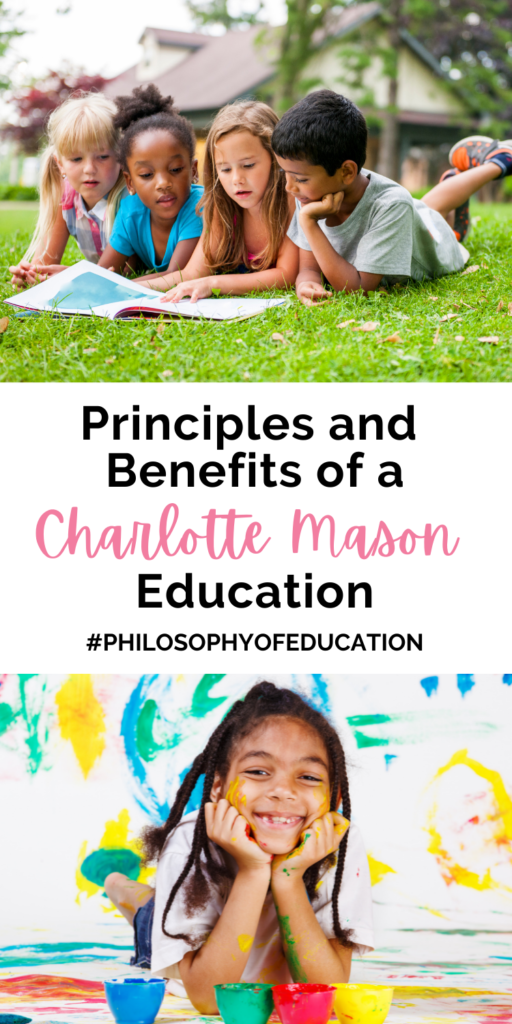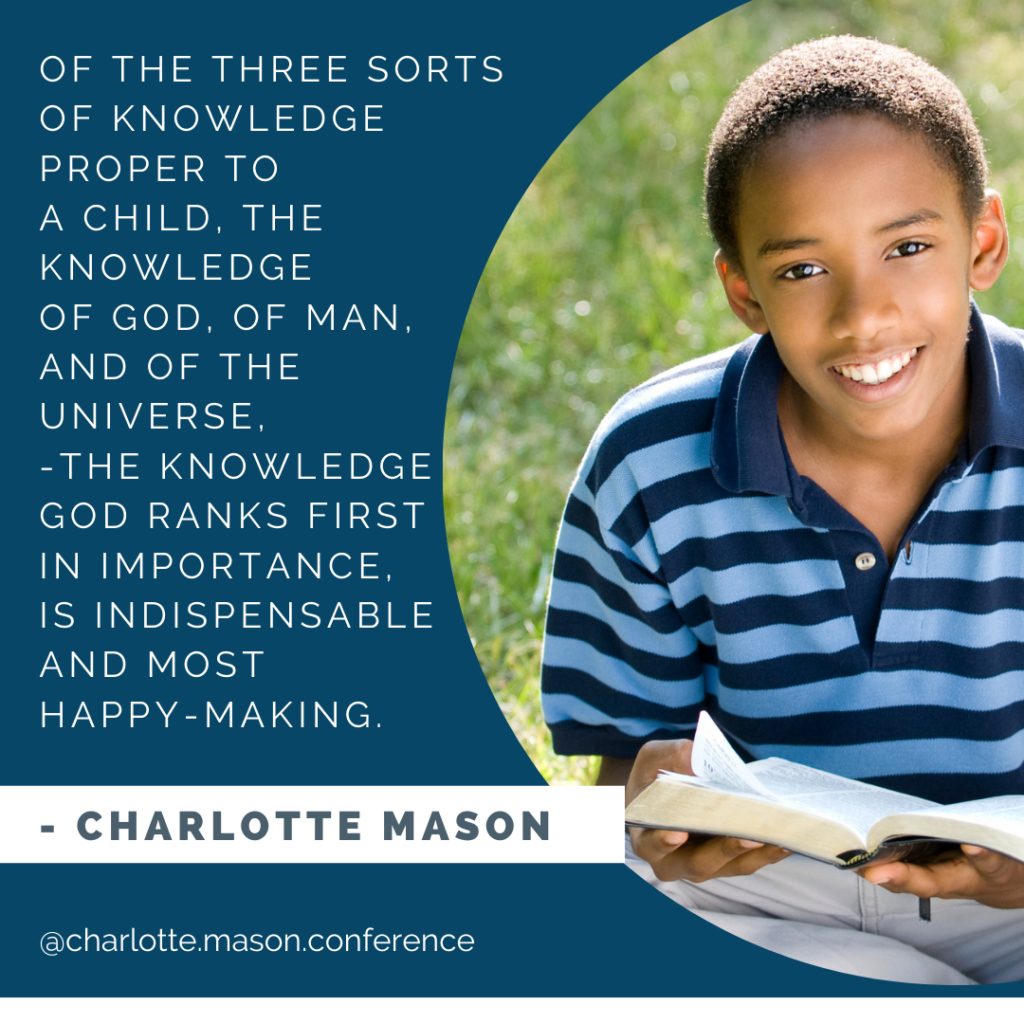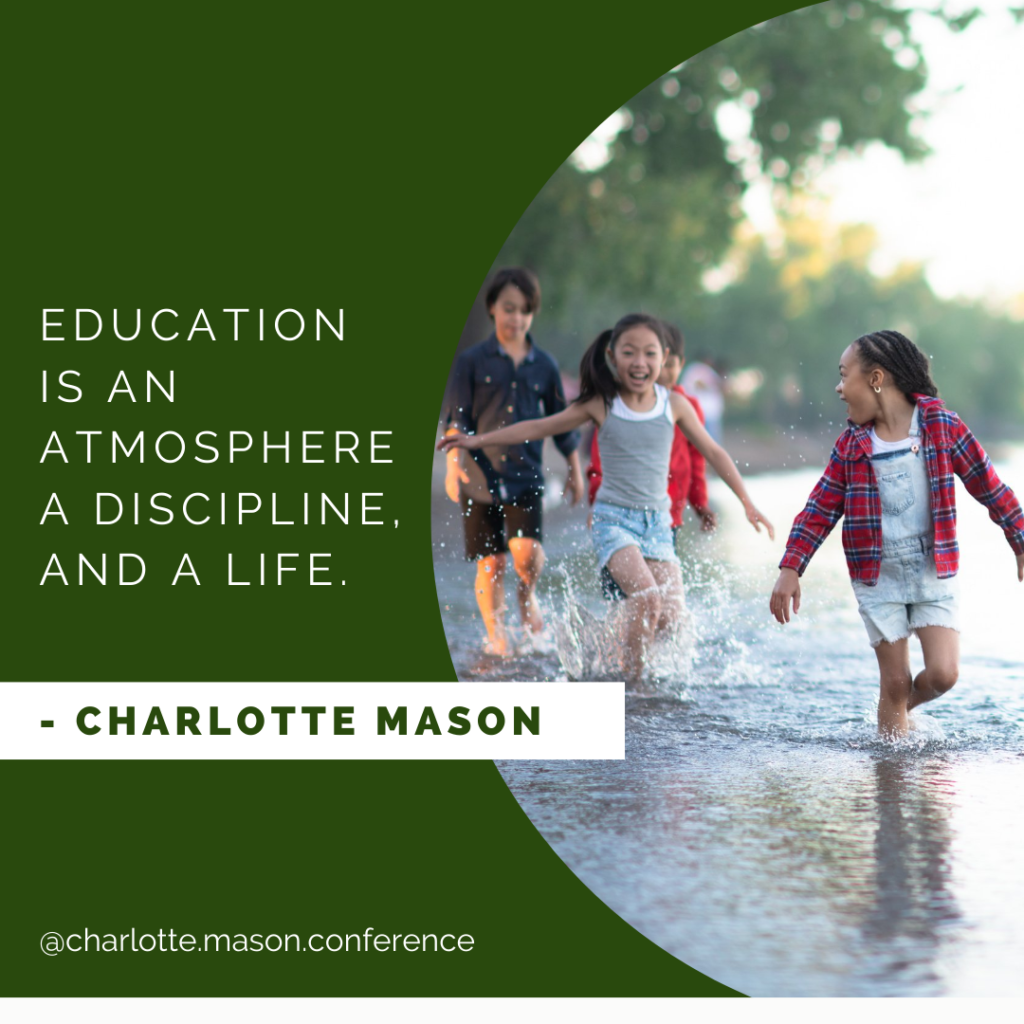Charlotte Mason was a British educator, who believed education is an atmosphere, a discipline, and a life. She believed children are people, with their own thoughts, and ideas, and should be treated as such. She was opposed to treating or talking to children as if they were inferior, unintelligent and ’empty canvases’ ready to be filled with ideas. Instead, she encouraged parents to raise children as independent thinkers.
Parents and teachers should know how to make sensible use of a child’s circumstances (atmosphere) to forward their sound education; should train them in the discipline of habits of the good life; and should nourish their life with ideas, the food upon which personality waxes strong.
Charlotte Mason believed education was about knowing who we are, and how we fit into the world created by God.

Principles of a Charlotte Mason Education
The Charlotte Mason philosophy is based on 20 principles:
1. Children are born persons.
2. They are not born either good or bad, but with possibilities for good and for evil.
3. The principles of authority on the one hand, and of obedience on the other, are natural, necessary and fundamental.
4. These principles are limited by the respect due to the personality of children, which must not be encroached upon whether by the direct use of fear or love, suggestion or influence, or by undue play upon any one natural desire.
5. We are limited to three educational instruments–the atmosphere of environment, the discipline of habit, and the presentation of living ideas.
6. When we say that “education is an atmosphere,” we do not mean that a child should be isolated in what may be called a ‘child-environment’ especially adapted and prepared, but that we should take into account the educational value of his natural home atmosphere, both as regards persons and things, and should let him live freely among his proper conditions. It stultifies a child to bring down his world to the child’s level.
7. By “education is a discipline,” we mean the discipline of habits, formed definitely and thoughtfully, whether habits of mind or body.
8. In saying that “education is a life,” the need of intellectual and moral as well as of physical sustenance is implied. The mind feeds on ideas, and therefore children should have a generous curriculum.
9. We hold that the child’s mind is no mere sac to hold ideas; but is rather, if the figure may be allowed, a spiritual organism, with an appetite for all knowledge. This is its proper diet, with which it is prepared to deal; and which it can digest and assimilate as the body does foodstuffs.
10. Such a doctrine as e.g. the Herbartian, that the mind is a receptacle, lays the stress of education (the preparation of knowledge in enticing morsels duly ordered) upon the teacher. Children taught on this principle are in danger of receiving much teaching with little knowledge; and the teacher’s axiom is ,’what a child learns matters less than how he learns it.’

11. But we, believing that the normal child has powers of mind which fit him to deal with all knowledge proper to him, give him a full and generous curriculum; taking care only that all knowledge offered him is vital, that is, that facts are not presented without their informing ideas.
12. “Education is the Science of Relations”; that is, that a child has natural relations with a vast number of things and thoughts: so we train him upon physical exercises, nature lore, handicrafts, science and art, and upon many living books, for we know that our business is not to teach him all about anything, but to help him to make valid as many as may be of–
“Those first-born affinities
“That fit our new existence to existing things.”
13. In devising a SYLLABUS for a normal child, of whatever social class, three points must be considered:
(a) He requires much knowledge, for the mind needs sufficient food as much as does the body.
(b) The knowledge should be various, for sameness in mental diet does not create appetite (i.e., curiosity)
(c) Knowledge should be communicated in well-chosen language, because his attention responds naturally to what is conveyed in literary form.
14. As knowledge is not assimilated until it is reproduced, children should ‘tell back’ after a single reading or hearing: or should write on some part of what they have read.
15. A single reading is insisted on, because children have naturally great power of attention; but this force is dissipated by the re-reading of passages, and also, by questioning, summarising. and the like.
Acting upon these and some other points in the behaviour of mind, we find that the educability of children is enormously greater than has hitherto been supposed, and is but little dependent on such circumstances as heredity and environment.
Nor is the accuracy of this statement limited to clever children or to children of the educated classes: thousands of children in Elementary Schools respond freely to this method, which is based on the behaviour of mind.
16. There are two guides to moral and intellectual self-management to offer to children, which we may call ‘the way of the will’ and ‘the way of the reason.
17. The way of the will: Children should be taught, (a) to distinguish between ‘I want’ and ‘I will.’ (b) That the way to will effectively is to turn our thoughts from that which we desire but do not will. (c) That the best way to turn our thoughts is to think of or do some quite different thing, entertaining or interesting. (d) That after a little rest in this way, the will returns to its work with new vigour. (This adjunct of the will is familiar to us as diversion, whose office it is to ease us for a time from will effort, that we may ‘will’ again with added power. The use of suggestion as an aid to the will is to be deprecated, as tending to stultify and stereotype character, It would seem that spontaneity is a condition of development, and that human nature needs the discipline of failure as well as of success.)
18. The way of reason: We teach children, too, not to ‘lean (too confidently) to their own understanding’; because the function of reason is to give logical demonstration (a) of mathematical truth, (b) of an initial idea, accepted by the will. In the former case, reason is, practically, an infallible guide, but in the latter, it is not always a safe one; for, whether that idea be right or wrong, reason will confirm it by irrefragable proofs.
19. Therefore, children should be taught, as they become mature enough to understand such teaching, that the chief responsibility which rests on them as persons is the acceptance or rejection of ideas. To help them in this choice we give them principles of conduct, and a wide range of the knowledge fitted to them. These principles should save children from some of the loose thinking and heedless action which cause most of us to live at a lower level than we need.
20. We allow no separation to grow up between the intellectual and ‘spiritual’ life of children, but teach them that the Divine Spirit has constant access to their spirits, and is their Continual Helper in all the interests, duties and joys of life.

About Living Books
The basis of Charlotte Mason curriculum is living books. These are books written in either a narrative or conversational style, by authors who are passionate about their subject. These are the complete opposite from common textbooks, which are generally comprised of snippets, facts, and timelines. Living books are stories that draw the reader in by cultivating curiosity and fostering a desire to learn more about the subject at hand.
Colleen Manning lists 4 questions you can ask yourself when trying to decide whether a book is a living book or not. You can read the article here.
Benefits of a Charlotte Mason Education
- The Charlotte Mason philosophy offers a stress-free, well-rounded approach to education.
- As children feast on living books they develop a natural love and passion for subjects, time periods and ideas they discover along the way.
- The discovery of ideas leads to curiosity and creativity.
- The variety of subjects and short lessons keeps children interested and engaged.
- Because education is an atmosphere, learning becomes organic and a part of their lifestyle.
- Narration allows students to fully understand the subject they’re learning about.
- Learning hands-on leads to retention.
Charlotte Mason Education Resources
The following are my go-to websites for all Charlotte Mason related topics, as well as some of the books I’ve read on the topic.
A Delectable Education Podcast
Ambleside Online
Everyday Graces
Our Journey Westward
Modern Miss Mason
My Little Robbins
Simply Charlotte Mason
Have you considered a Charlotte Mason approach? Why or why not?
If you’d like to learn more about Charlotte Mason, and how you can incorporate her philosophy in your homeschool, check out our conference workshops on-demand.




Pingback: 5 Charlotte Mason Techniques for Eclectic Moms - Charlotte Mason Inspired